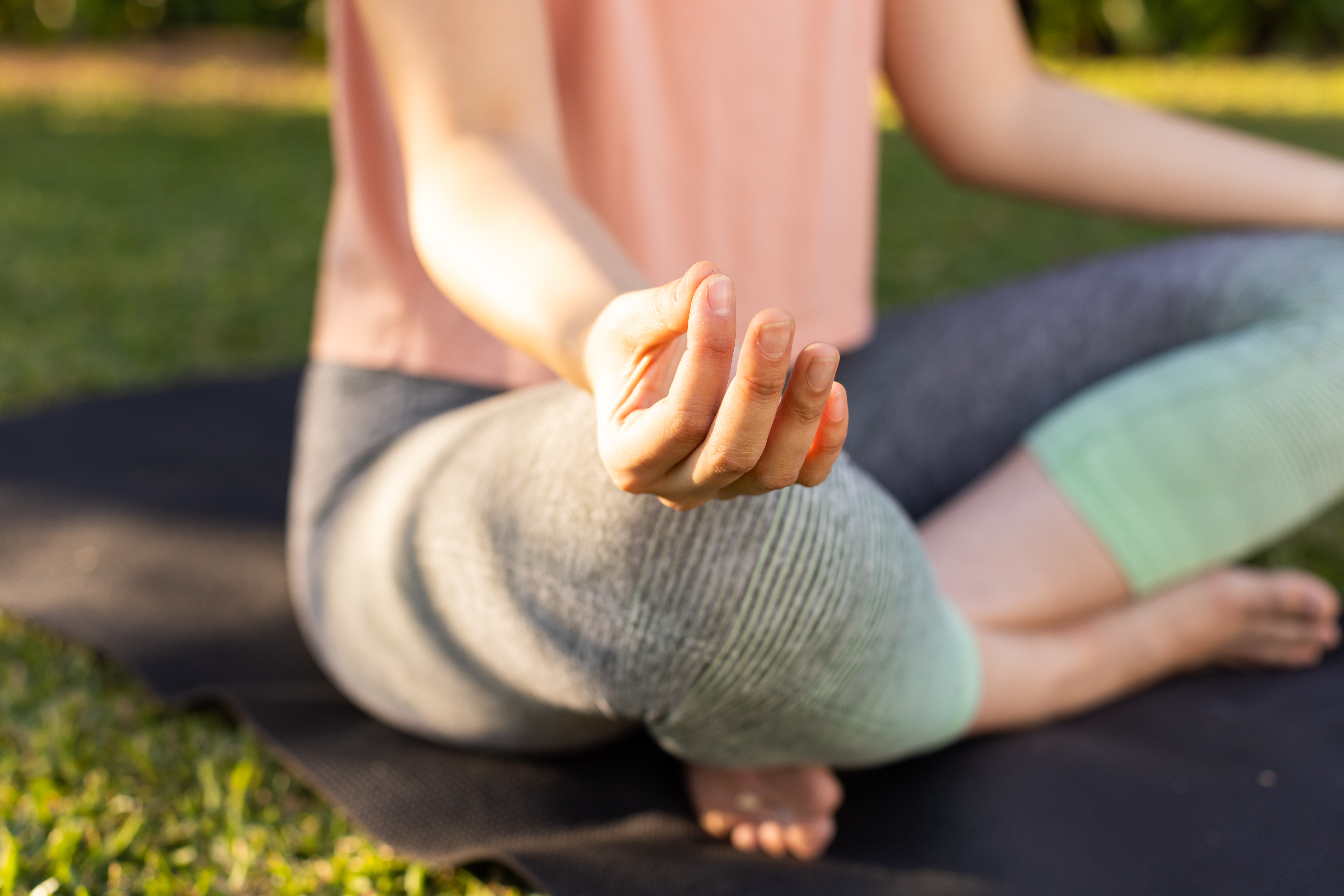

Think meditation is a mysterious, hard-to-master exercise? Think again. I used to assume that meditation was complicated and time-consuming plus who could possibly keep their mind still?
Even how to get started can be unclear: Should you sit on the floor? Use an app? Chant or even come up with a mantra? And how long is long enough?
When you think of meditating, what comes to mind? A lotus position, a yoga mat, a beautiful wood-lined room? However, meditation can be done anywhere.
During some very stressful periods of my life, I learned to zone in as opposed to space out. I also learned that it is impossible to fail at meditation. Meditation is all about connecting with your breath. It’s about being present and disengaging from the mental chatter in your head – those distracting, incessant and uncontrollable daily thoughts. There are many ways to meditate and whichever way works for you is the right way to do it.
The benefits of a meditation practice are no secret. The practice is often touted as a habit of highly successful (and happy) people, recommended as a means of coping with stress and anxiety, and praised as the next-big-thing in mainstream wellness. And it’s not just anecdotal. Thousands of studies have shown the positive impact that meditating has on our health and well-being. Here are some big reasons from Wanderlust.com to take up the practice of meditation; find a quiet space and zone in!
Sleep isn’t just relaxation for eight hours a day—it’s essential to our cognitive functioning. Meditation gives you all sorts of benefits, like enhanced REM sleep and increased levels of melatonin.
Turns out meditation can even help serious sleep problems. Researchers conducted a study to see if mindfulness meditation would benefit those struggling with chronic insomnia. After eight weeks, those in the meditation training had less total wake time during the night, were more relaxed before going to bed, and reduced the severity of their sleep problems. Plus, in a follow-up study six months later, the insomnia sufferers had maintained a better quality of sleep.
It’s a little-known secret that Wall Street execs, famous artists, and Silicon Valley whiz kids are some of the biggest advocates of meditation as a way to manage stress.
A 2005 study at Harvard Medical School found that meditation increases the thickness of your prefrontal cortex, the area of your brain associated with attention and self-awareness.
Furthermore, we now know it even reduces employee stress and burnout. A study on teachers at a school for children with severe behavioral problems who were treated to a Transcendental Meditation program had less stress, less depression, and overall lower burnout than other teachers.
Researchers at UC San Francisco studied a group of women to test if meditating could prevent overeating. The scientists didn’t prescribe any diet, but instead taught mindful eating, and had participants meditate for thirty minutes a day. What happened? While the control group actually gained weight, the treatment participants maintained their weights, plus lowered their cortisol levels. Higher reductions in cortisol and stress also showed higher reductions in abdominal fat.
Jon Kabat-Zinn, who heads up the Center for Mindfulness in Medicine at the University of Massachusetts Medical School, proved back in the ‘80s that meditation and mindfulness could significantly improve pain symptoms and quality of life in chronic pain patients, even up to four years later. His program, called Mindfulness-Based Stress Reduction (MBSR) is practiced widely.
Recently, we’ve also been able to take a look at how the brain might be involved. When researchers had people participate in four days of mindfulness-based training, participants reported less pain intensity and unpleasantness. What’s more, MRIs showed reductions in pain-induced cerebral blood flow during meditation sessions.
Focusing on all the terrible things that might happen to us—but often don’t!—takes us away from the present, and causes our bodies a lot of stress.
Dr. Elizabeth Hoge, a psychiatrist and assistant professor of psychiatry at Harvard Medical School, found that meditation could even help those with generalized anxiety disorder, a condition marked by hard-to-control worries, poor sleep, and irritability.
Meditation helps us gain awareness of our minds, so we can see negative thoughts and say “those thoughts are not me.” Becoming less identified with our emotions and thoughts helps those thoughts lose power.
A Harvard study found that mind-wandering, which often means drifting to these negative thoughts, was linked to unhappiness. And recently, Madhav Goyal, who led a study by Johns Hopkins researchers, said that for depression, “we found a roughly 10 to 20 percent improvement in depressive symptoms compared to the placebo groups. This is similar to the effects of antidepressants in similar populations.”
Relaxing your body and mind with meditation helps you to stay centered when you inevitably encounter those everyday stressors—rush hour traffic, anyone?
Investigators from the Benson-Henry Institute at Massachusetts General Hospital found that practicing meditation causes what is called the “relaxation response,” the opposite of the “fight-or-flight” response—what happens to our bodies when we get stressed. Their studies showed that the relaxation response alleviates anxiety and also has positive effects on heart rate, blood pressure, and brain activity.
Your partner will thank you. By learning to better recognize your own emotions, and those of others, you’ll more easily experience lasting harmony in your relationships.
Researchers from the University of California-San Francisco taught 82 female teachers, all married or living with a partner, how to meditate. Compared with a control group that hadn’t learned meditation, the women gave fewer negative facial expressions during a marital interaction test. Good news, because studies at UC Berkeley showed that people who demonstrate negative facial expressions toward their partners are more likely to divorce.
Maharishi International University in Iowa found that women who practiced meditation reported significantly greater marital satisfaction than those who didn’t. Those who meditated regularly saw the greatest benefits.
Maybe you’ve heard that it takes 10,000 hours of practice to be great at something. The Beatles played 1,200 concerts together before becoming internationally known. Bill Gates started programming in eighth grade. But new research shows there’s a different formula for success.
World-class athletes, top managers, and world-class performers, when tested, have all shown high levels of what’s called brain integration. This means that their brains are wired with strong connections between the different areas, they have heightened attention, and they’re able to think quickly to deal with problems.
This is the new key to success, as noted by U.S. neuroscientist Dr. Fred Travis because it’s the fire starter behind the creativity that often leads to success.
Luckily, a study from Harvard Medical School demonstrated that meditation causes changes in brain waves that actually improve the brain’s functionality. You can find success in any area of your life, and just think of all the time you’ll save!
Don’t expect to be able to do marathon meditation sessions immediately – even though my dog Bailey seems to be able to meditate effortlessly.
I recommend that you meditate for no more than three to five minutes in the beginning and then increase the time weekly to a maximum of 20 minutes.
To get the most out of your sessions, try setting a kitchen timer or an alarm. This removes the temptation to continually check the clock to find out how long you’ve been meditating or how long you have left.
If you would like to join us in our conversation with Dr. Carol Greco from the University of Pittsburgh Center for Integrative Medicine who talks with us about the benefits of meditation:
Or if you want to try meditation with us – click on this video.
In health,
As always, if I can help you – feel free to jump on a complimentary half-hour call with me by clicking on the link to my online calendar and then find a good time for you.

The Holistic HIghway integrates traditional Western medical practices with Ayurveda medicine, creating a focus on prevention through nutrition, diet, and exercise; use of the latest genetic testing and other diagnostic techniques; and prescribed combinations of botanical medicines, supplements, therapeutic diets, detoxification programs, or stress-management techniques.

Integrative Health Expert | Ayurveda Practitioner | Author | Speaker
Kerry is a globally recognized leader in integrative medicine and the science of health known as Ayurveda. She is passionate about raising awareness of the need for a change in contemporary medicine that focuses on patient empowerment and a health-based (rather than disease-based) medical system.
Kerry is connected with The University of Pittsburgh Center for Integrative Medicine and remains a pioneer in the field of integrative medicine where she has developed a personalized system to manage chronic disorders by incorporating fundamental changes in diet, behavior, and stress while focusing on genetics.
This individualized program is so successful that many of her clients have achieved maximum healing and vitality after years of chronic problems!
More to Explore